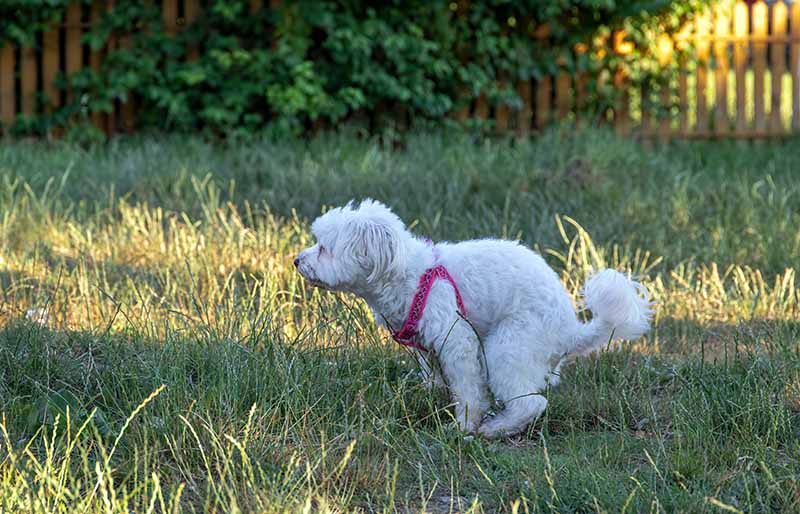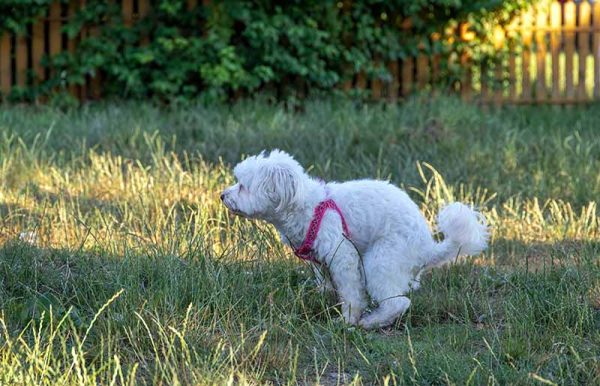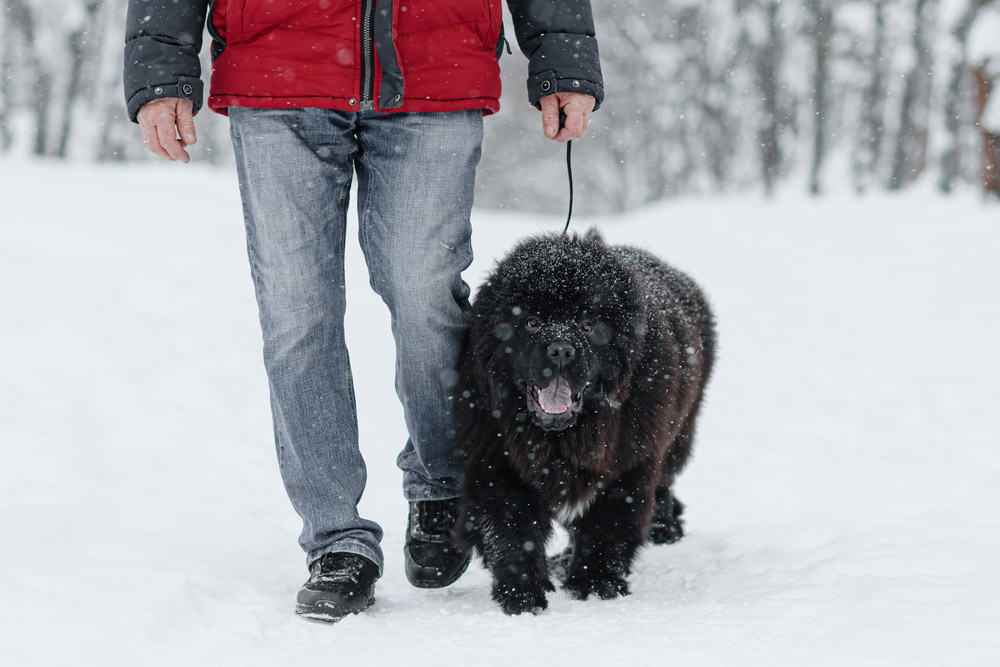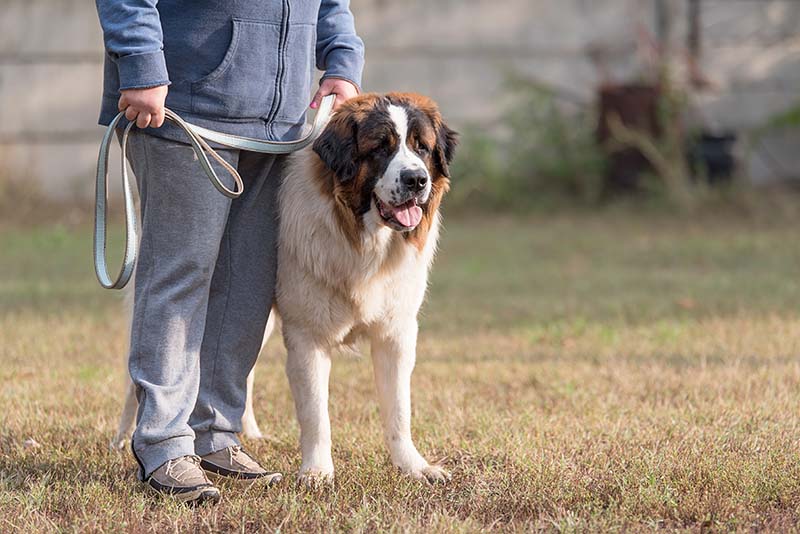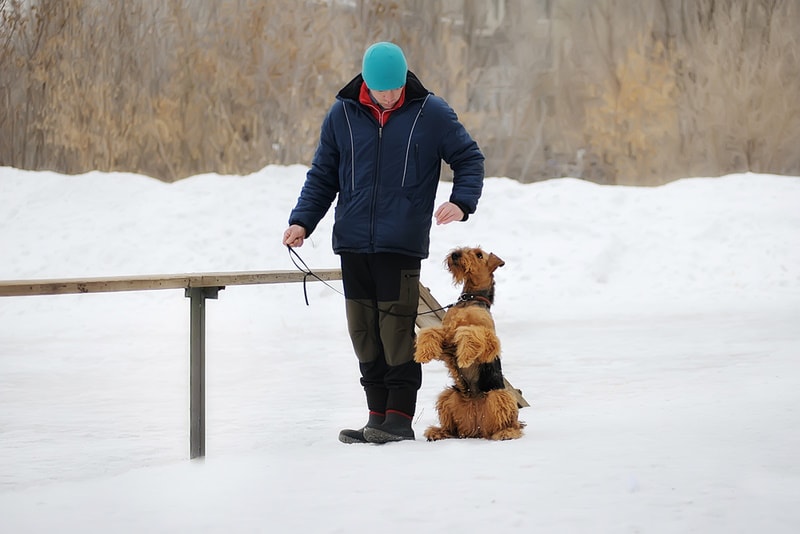Potty training your puppy isn’t just an important part of being a responsible dog owner; it’s also an essential part of keeping your house clean! While housebreaking your Maltese puppy will take time and effort, the process will go easier if you have helpful advice to rely on. In this article, we will share 10 tips for potty training your Maltese puppy so that you can easily house-train your new dog.
Before You Start
Before you begin potty training your Maltese puppy, you will want to designate a specific spot as their potty place. Giving your puppy a specific spot to go potty helps them to make the association between this location and the appropriate time to go potty. The idea is to train your dog to hold their urge to go until they are allowed outside to use their spot instead of going in your house.
To pick a good spot, ensure it is easily accessible and does not take a long walk to reach. At the same time, make sure that it is far enough away from family areas (such as grills, outdoor furniture, or playgrounds) so that those spaces are not contaminated. A minimum of 10 feet away is a good rule to stick to.
Once you pick a spot, do not change it. This will confuse your puppy and may ruin all the training you have done up until now.
The 10 Tips and Tricks to Potty Train a Maltese
1. Pick a Word
Once you’ve brought your Maltese puppy to their potty place, you need a command word to tell them that it is time to use the bathroom. This will help your puppy firmly establish when it is appropriate to go potty. Pick a word that is short and simple so the command doesn’t confuse your dog. “Potty” is perfectly acceptable.
The first few times you take your Maltese puppy to their potty place, say “potty” right before they urinate or defecate. With enough repetition, your puppy will learn to associate the command with permission to use the bathroom.
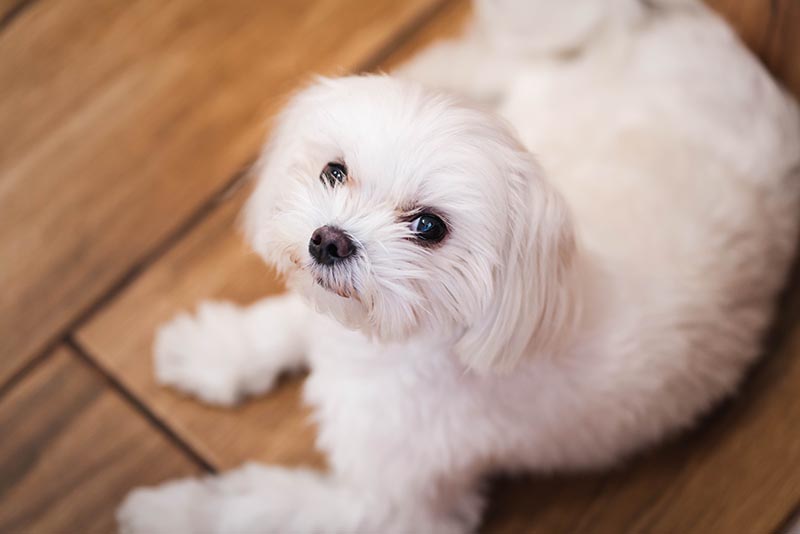
2. Work on Crate Training
Crate training is a key component of caring for your puppy, as it helps provide your dog with a safe, private space to unwind and relax. Likewise, it can be an effective tool for potty training.
With crate training, you give your puppy a place to sleep and eat. Dogs do not prefer to urinate or defecate where they rest, so your puppy will try to resist going potty inside his crate.
When crate training, never use the crate as punishment, or you will create negative associations for your puppy. This will only make other house-training matters more difficult. Similarly, it is essential that you purchase a crate that is not too small and not too big. If the crate is too large, your Maltese puppy may go potty on one end and eat and rest on the other, which is the opposite of what you want to accomplish.
3. Walk Your Maltese on a Leash
When taking your Maltese out to their potty place, always keep them on a leash. This will allow you to lead your puppy to the specific space that you want them to go and prevent them from running off and going potty somewhere else. Another reason to keep your puppy on a leash is to keep them close so you can reward them after they use the right spot.
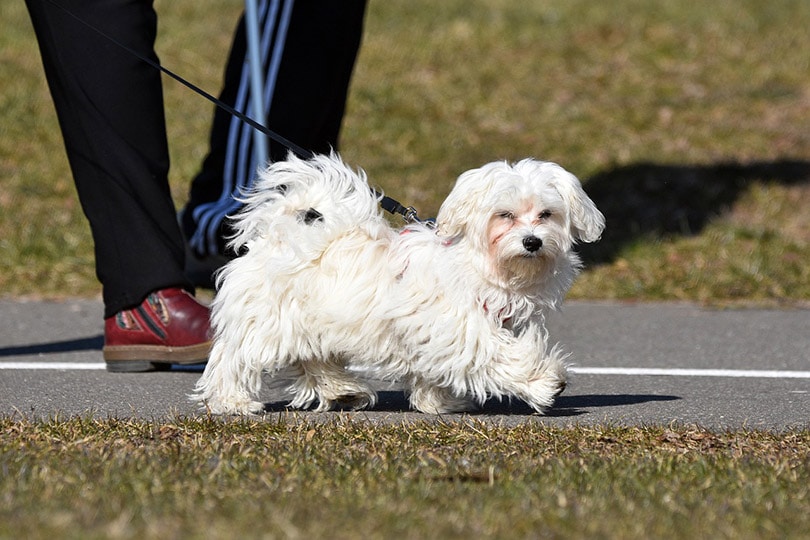
4. Stick to a Regular Feeding Schedule
You may think that when you choose to feed your puppy will have very little to no impact on potty training, but the truth is that it makes more of a difference than you may realize. Your puppy will eat around three to four meals each day and typically need to go potty shortly afterward. By keeping a consistent feeding routine, you will know when to take your puppy out to avoid potty accidents. Also, consistency will create a schedule for your puppy to help them avoid confusion and accidents.
5. Take Your Puppy Out for Frequent Potty Breaks
Puppies need to be taken out for potty breaks often. At 2 months of age, you should take your Maltese puppy out every 2–3 hours. When your puppy is 3 months old, take them out every 3–4 hours. At 4 months, take them out every 4–5 hours. At 5 or 6 months of age, your puppy should have full control over their bladder and bowel functions. Still, it would be best if you took your Maltese out for three to five bathroom breaks each day.
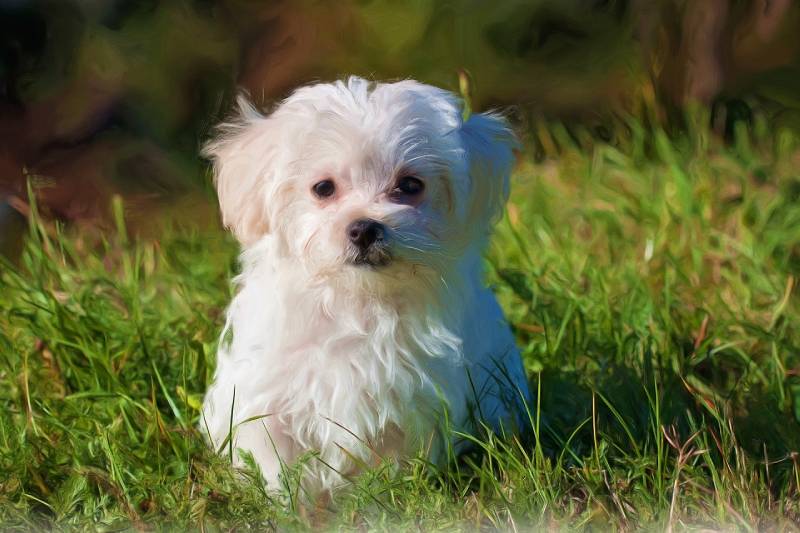
6. Recognize When Your Puppy Needs to Go Potty
The more you get to know your Maltese puppy, the better you will understand their body language and when they need to go potty. The sooner you learn your puppy’s signals, the sooner you can take action to prevent accidents in the house.
Typically, puppies will sniff, whine, or sit by the door when they need to go potty. Some dogs will also pace in circles or wander off. Whatever your Maltese does, learn their signals and supervise them so you can take them out when they need to.
7. Don’t Rely on Potty Pads
While potty pads can be useful to prevent messes, they should not be relied upon as a substitute for outdoor potty areas. You could confuse your puppy if you rely on the pads too heavily. When misused as a substitute for outdoor potty places, potty pads can stunt the potty-training process and create much more work for you and your puppy.
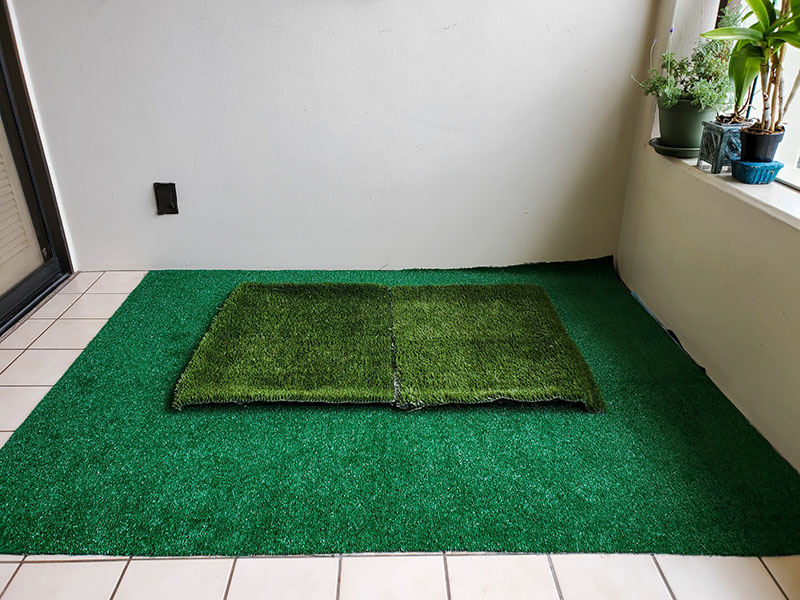
8. Use Positive Reinforcement
Maltese puppies do not respond well to punishments, so avoid them entirely. Instead, focus on positive reinforcement. When your puppy receives a reward for going to the correct spot, they create a pleasant association with the behavior you desire. On the other hand, punishing your Maltese for going potty indoors may cause them to associate punishment with going potty in general, which is neither healthy nor helpful.
Rewarding your pet for going to the designated area can include verbal praise, pets, a favorite toy, or even treats. Ensure the reward follows instantly so your puppy can connect the desired behavior to the reward.
9. Deal With Accidents Calmly & Clean Up Properly
If your puppy is in the middle of having a potty accident, it can be difficult to resist the urge to yell in panic. However, squash this urge whenever you notice it coming up, as yelling will only frighten your puppy and confuse them. Instead, calmly clean the mess, and evaluate the moment to determine what went wrong. For instance, was your puppy giving you signs that you missed?
While cleaning the mess, make sure that you are thorough. Dogs have superior senses of smell and can smell their own waste on objects even when we think that it is clean. If your dog can smell it, they may continue to go potty in the same spot.
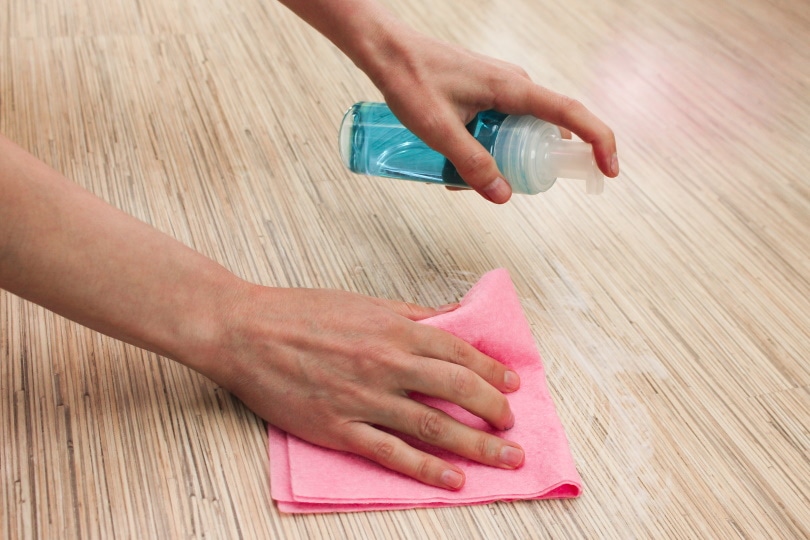
10. Try to Keep Exciting Experiences Outdoors
An excited puppy may urinate on accident, especially when they are younger. This is because your young puppy does not have total control over their bladder yet, so high levels of excitement may cause them to have an accident.
So, when playing with them, introducing them to new friends, or doing anything exciting, keep it outside. That way, if they accidentally go potty, no harm is done. If there is a reason that you cannot go outside, this could be a beneficial time to use potty pads.
In Summary
Potty training takes time and dedication, and sometimes it may be frustrating. While house training your puppy, remember that they are eager to please you and do not have potty accidents to be spiteful or mean. Keeping your patience and maintaining your enthusiasm during rewards are two key ways to make your puppy’s potty training experience positive.
Featured Image Credit: Razvan Ciuvelic, Shutterstock
Contents
- Before You Start
- The 10 Tips and Tricks to Potty Train a Maltese
- 1. Pick a Word
- 2. Work on Crate Training
- 3. Walk Your Maltese on a Leash
- 4. Stick to a Regular Feeding Schedule
- 5. Take Your Puppy Out for Frequent Potty Breaks
- 6. Recognize When Your Puppy Needs to Go Potty
- 7. Don’t Rely on Potty Pads
- 8. Use Positive Reinforcement
- 9. Deal With Accidents Calmly & Clean Up Properly
- 10. Try to Keep Exciting Experiences Outdoors
- In Summary

